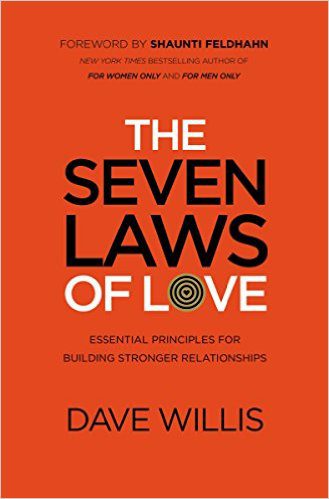Raising a family is a wonderful privilege, a sacred responsibility and probably the hardest job you’ll ever have! I spend a great deal of time interviewing families, studying marriage and family-based research and investigating what the Bible (the world’s greatest marriage and parenting manual) has to say about building stronger family relationships. I’ve put it all into the chapter on “Loving your family” from my book The Seven Laws of Love and I’ve put the entire chapter below as a FREE resource for you. I believe so much in getting this message out there that I’m sharing this entire, vitally-important chapter with you (and you don’t have to buy anything or sign up for anything. Seriously). My only request is that you take it to heart and apply these Biblical principles in your home. I hope it encourages you and makes a positive impact in your family! Thanks and God bless. –Dave
The Seven Laws of Love: Essential Principles for Building Stronger Relationships Chapter 9: “Loving Your Family”
“Love each other with genuine affection, and take delight in honoring each other.” —Romans 12:10
Ashley was a refined, classy, lovely woman who grew up in a house full of girls. By contrast, I was basically a caveman who had been raised in a house full of guys. Our family backgrounds were very different, which required a big adjustment for us both.
For instance, I never use clippers on my toenails. This is something she discovered after we were married. It didn’t seem weird to me. I always thought, “Why would you want to take something sharp and put it on your toes?”
When my toenails start getting too long, I just pick at them, leaving sharp, jagged edges. I am like Wolverine, except the claws grow out of my feet. I know what you’re thinking, and you’re right. It’s a disgusting habit.
One night, we were sound asleep. Around 2:00 a.m., I woke up to the sound of Ashley screaming out in pain. I was terrified; I was confused. I was stumbling around, thinking there was an intruder in the house. It was pure chaos!
We turned the lights on, and her leg was bleeding. I thought someone had broken into our house and stabbed my beautiful wife in the leg. In our delusional state, we started trying to piece together all the evidence, and we realized there was some blood on my big toe as well. We finally deciphered the clues and solved the mystery. I was the intruder, and my disgusting toenail was the weapon!
Looking back on that crazy night brings a lot of laughter, but it also raises some important questions. If we’re supposed to love and cherish our families, how do we do it in spite of all their unlovable flaws? Does love make us ignore, accept, or attempt to change each other’s imperfections?
Love and Family
When God created the concept of a family, he simultaneously gave us an extraordinary gift and an extraordinary challenge. Family requires an unshakable commitment to each other even when everyone involved is intimately aware of each other’s flaws.
These iconic words below are from “The Love Chapter” found in the Bible. 1 Corinthians 13 contains some of the most famous words ever written about love. These famous words aren’t just a poetic description of love; they also represent a very practical road map to guide your family in the right direction.
Love is patient and kind. Love is not jealous or boastful or proud or rude. It does not demand its own way. It is not irritable, and it keeps no record of being wronged. It does not rejoice about injustice but rejoices whenever the truth wins out. Love never gives up, never loses faith, is always hopeful, and endures through every circumstance. (1 Corinthians 13:4–7)
Let’s take a moment to briefly unpack these verses and explore what their application might look like in your family:
- Love is patient and kind, so be patient and kind with each other.
- Love is not boastful or proud, so refuse to allow the poison of pride to taint your relationships.
- Love is not self-seeking, so choose to put your family’s needs ahead of your own.
- Love is not easily angered, so allow no place for spite or hostility in your home.
- Love keeps no record of wrongs, so allow grace and forgiveness to flow freely.
- Love rejoices with the truth, so refuse to deceive or keep secrets from each other.
- Love always protects and perseveres, so never give up on each other.
Make a conscious decision to love each other using God’s definition of love. Allow your family to be led by love, and you’ll always be headed in the right direction.
The Family of God
Family is one of God’s greatest gifts. Of course, all of us have a few rowdy relatives we’d probably never choose to hang out with if we weren’t related, but even with the occasionally awkward Thanksgiving dinner, most of us can agree that family is a wonderful blessing. A family is masterfully designed to provide support, encouragement, accountability, love, and a place to call home. It fills the most crucial human needs.
God’s ultimate plan for family reaches beyond just the physical into the spiritual. He has created a family that will last forever, and the Bible has a lot to say about how it looks and how we can and should be a part of it. Here are a few truths the Bible teaches on the subject of God’s family:
- God intended his church to be a family.
In God’s design, family extends beyond biological relatives. The church is not a building or an organization. It’s a body of believers making up a family. The world attempts to define us by race, gender, age, socioeconomic status, outward appearance, and all kinds of other factors that don’t really define who we are, but the church is a place where all those labels should disappear and be replaced by the unity we have in Christ.
“There is no longer Jew or Gentile, slave or free, male and female. For you are all one in Christ Jesus” (Gal. 3:28).
- As a family, we are defined by our love.
Jesus never intended for his followers to be identified by how they look or by the bumper stickers on their cars. The DNA of God’s family is simply love. We must have a love for God and for each other. That’s how the world will know we’re part of God’s family.
“Your love for one another will prove to the world that you are my disciples.” (John 13:35)
- As a family, we need to take care of each other.
God designed the church so that every person in it would have their needs met. Financially, relationally, and emotionally, we need to support one another and work together to provide hope and healing to people outside the church as well.
“Therefore, whenever we have the opportunity, we should do good to everyone—especially to those in the family of faith” (Gal. 6:10).
- God wants you in his family.
Maybe you feel like you don’t belong anywhere, but you were created to be part of God’s family. It begins by reaching out to Jesus in faith.
“Anyone who does the will of my Father in heaven is my brother and sister and mother!” (Matt. 12:50).
Love and Parenting
“Train up a child in the way he should go, And when he is old he will not depart from it” (Proverbs 22:6)
These concepts of love we’ve been learning thus far apply to every familial relationship, whether it’s among a church family, siblings, parents, children, or in-laws. For the remainder of this chapter, I’m going to focus primarily on the role of love in the context of parenting, simply because it’s where we tend to need practical principles the most. It also represents a generational impact. Your parenting won’t just affect your kids, but it will shape future generations of your family.
I don’t know about you, but most days I feel completely unqualified to be a parent. The life, health, training, and livelihood of four little boys is a huge responsibility, and most days I feel like I fall way short. I recognize that God has given my wife and me the privilege of raising Cooper, Connor, Chandler, and Chatham, and I want to raise them to be strong, courageous, faithful, smart, thoughtful, respectful, and wise men of character. I often feel like I can’t compete with the world’s bombardment of negative influences. If you’re a parent, you can probably relate to my feelings of inadequacy.
I recently heard a preacher named Mike Breaux tell the story of being outside on a warm, Kentucky summer night and noticing the lights in the sky. He noticed the moon and the stars and the lights from a distant factory down the road, but then all of those big lights were eclipsed by a new light that captured his full attention. A lightning bug lit up right by his face, and that little firefly was all he could see.
In that moment he realized that there are all kinds of lights (outside influences) competing for the attention of his kids, and if he wanted to be the biggest influence in his kids’ lives, he didn’t have to be the biggest or the brightest. He just had to be the closest! That beautifully simple word picture stuck in my mind and revealed the secret for having (and continuing to have) the most impact on my children.
It’s the same for all of us. Howard Hendricks has wisely stated, “You can impress people from a distance, but you can only impact them from up close!”
There will always be impressive-looking forces trying to be the primary influence on our kids, but we can make the biggest impact by simply staying close to our sons and daughters. Make quality (and quantity) time with them a priority. Refuse to let outside influences pull them in the wrong direction. Give them a solid foundation of faith and love, and know that even though we are all imperfect parents, we have a perfect heavenly Father who is by our side through it all.
Seven Ways Parents Harm Their Children without Even Realizing It
As a parent, I blow it pretty much every day in some way. Sometimes it’s when I lose my temper and yell at the kids. Other times, it’s when I burp out loud at the dinner table right after I’ve scolded one of my boys for doing the same thing.
With most of my parenting blunders, I’m instantly aware of the mistake, which gives me the opportunity to apologize and try to correct it, but I’ve found that some of the most dangerous parenting mistakes aren’t obvious. They’re subtle and stealthy. This makes them even more dangerous, because we can go on doing them for years without even realizing we’re harming our kids in the process.
As I have worked with families from all walks of life, I’m convinced that the list below represents some of the most common and destructive parenting mistakes. I’m not writing this as an expert but just as a dad who is in the trenches and is desperately trying to get this right for the sake of my kids and future generations of my family.
If you’re a parent, too, let’s commit to stopping these behaviors and being the best we can be for our kids.
- Subtle dishonesty
Kids are human lie detectors, and we can’t teach them the value of honesty and integrity when we’re willing to be dishonest. We can’t cheat on our taxes and still have the moral authority to teach our kids they shouldn’t cheat in school. We need to teach our kids to tell the truth even when it’s inconvenient or costly.
- Emotional Sabotage
It’s easy to fly off the handle when our children aren’t listening or when they’re being careless or disobedient. Sometimes we’ll even use our emotions just to get a reaction from our kids. This is dangerous, because when we can’t control our emotional reactions to our children, we’re teaching them that they are in control of our emotions instead of us. This can create a long-term pattern of emotional dysfunction in the home.
- The comparison trap
In an attempt to encourage or correct our children, we might point out the example of another child (often a sibling) as a reference point. While this is usually a harmless attempt to bring context to the situation, most children won’t see past the comparison. This can subconsciously train children not to be the best they can be, but rather to find a way to simply seem better than their peers and siblings.
- Guilty gifts
In our culture (I’m writing from an American perspective), we’ve developed a bad habit of buying our kids’ affection with gifts. When we’ve made a mistake or had to work late, we’re much more likely to repay the relational debt with money. This cycle can teach our kids to be materialistic and to see love as a transactional relationship that can be manipulated by money. We all know (or should know) that real love is something much more valuable than that.
- Putting the happiness of your children ahead of the health of your marriage
Many couples won’t even go on a date night because they’re afraid the children will cry. To pacify the kids, they never invest in their relationship with each other. Ironically, many of these kids end up crying anyway after divorce rips the family in two. One of the greatest gifts you can give your children is the security that comes from seeing their parents in a loving, committed marriage.
- Digital babysitters
I’ve been guilty of this one a lot. In our technology-driven world, it’s easy to plop the kids down in front of a screen so we can get some stuff done. In small doses, this is okay, but it can develop into a dangerous habit where we’re delegating our most sacred duty of raising our kids to TV shows and video games.
- Hiding your flaws
We all want our kids to see us as superheroes who never make mistakes, but our kids aren’t looking for perfection. They’re looking for authenticity. When you’ve blown it, own it! Use it as a teaching moment. Remember that God is the only perfect parent, and his grace has got you covered in those moments when you mess up (and we all have plenty of those).
Seven Values Every Parent Must Teach Their Kids
Loving our kids requires more than just avoiding negative mistakes; it means proactively and consistently teaching them the values that matter most.
After looking at everything the Bible (the world’s greatest parenting manual) has to say about parenthood and borrowing wisdom from some parents who are much wiser than I am, I’ve put together a list of the seven most important lessons every parent must teach their children. If you consistently teach these values, you’ll be raising future world-changers!
Take responsibility for teaching these lessons to your kids. It’s not the government’s job, it’s not the schoolteacher’s job, and it’s not even the church’s job. You can’t delegate the responsibility of parenting. God entrusted these kids to you. It’s your great privilege and your sacred duty to impart these timeless values to your children.
You can’t delegate the responsibility of parenting.
- Tell the truth.
Honesty is the value that fortifies a solid foundation for all other values. Your kids need to know that lying is unacceptable. Make truth a central value in your home, and you’ll build a lifelong bond of trust with your children.
“I could have no greater joy than to hear that my children are following the truth” (3 John v. 4).
- Honor your parents.
If your kids don’t learn to have respect for you, they’ll struggle to have respect for anyone or anything else. They don’t always have to agree with you or like what you’re saying, but they must respect and honor you.
“Honor your father and mother. Then you will live a long, full life in the land the Lord your God is giving you” (Ex. 20:12).
- Love each other.
For a family to work, you don’t always have to like each other, but you always have to love each other. Your children must know that they are loved completely and unconditionally, and they must give that same unconditional love to their siblings and parents. Your words are important, but your actions are even more important when it comes to communicating your love.
“Dear children, let’s not merely say that we love each other; let us show the truth by our actions” (1 John 3:18).
- Do your best.
While love should never be conditional upon performance, your kids still need to know that excellence matters. It honors God, inspires people, and helps your children reach their full potential. Even the smallest acts (cleaning their room, doing homework) should be seen as an opportunity to give their best effort.
“Work willingly at whatever you do, as though you were working for the Lord rather than for people” (Col. 3:23).
- Be patient.
Delayed gratification isn’t often modeled or valued in our culture, but it’s still vital to a healthy, balanced life.
“Always be humble and gentle. Be patient with each other, making allowance for each other’s faults because of your love” (Eph. 4:2).
- Be thankful.
In a culture of entitlement and materialism, genuine gratitude shines like stars in the night sky. Teach your kids to be grateful and thankful in all circumstances. No matter how bad things might get, there are always reasons to be thankful.
“Be thankful in all circumstances, for this is God’s will for you who belong to Christ Jesus” (1 Thess. 5:18).
- Never give up.
In a world of quitters, teach your children to persevere.
“I have fought the good fight, I have finished the race, and I have remained faithful” (2 Tim. 4:7).
My Favorite Parenting Advice
I want this chapter to be as practical as possible, so I’m including some of my all-time favorite parenting advice. These nuggets of wisdom have helped me love and lead my kids with more focus, and I hope these tips do the same for you:
- Don’t use anger to get action. Use action to get action.
Dr. James Dobson taught this basic principle, which has deeply resonated with me. As parents, we all fight the temptation to respond to our children’s disobedience with anger, but anger doesn’t work. Action does. When we calmly respond by giving cool-headed discipline, then our kids will also respond. Granted, this is easier said than done, but it really does work.
- Be intentional about what you reward.
Discipline isn’t just handing out negative consequences; it is also rewarding positive behavior. Sometimes we inadvertently reward negative behavior by giving in to our kids’ demands because we’re tired of fighting about it. This is a huge mistake because we’re actually reinforcing their negative behavior when we do that. One principle I’ve found to be so true is that rewarded behavior is repeated behavior.
- Give clear boundaries.
In a football game, every player on the field knows what is out of bounds. On the highway, every driver knows not to cross the double yellow lines. Those boundaries are there for the protection of all, and they actually exist to give freedom, not to restrict it. Many times our kids don’t have any idea what behavior is out of bounds, because we constantly change the rules based on our own emotions. We’ve got to clearly and consistently communicate the boundaries. Doing so will give our kids confidence and the ability to succeed.
- Give unconditional love and high expectations.
Most of us are good at either giving our kids a lot of love and encouragement or giving them a lot of correction. We either come across like a Hallmark card or like a drill sergeant. Kids are complex, and they actually need both.
A Letter to My Kids
As I close this chapter, I want to share a letter to my kids. If you have children, I encourage you to write your own letter to them. Your words have the power to shape their view of love and their view of themselves.
Cooper, Connor, Chandler, and Chatham,
You guys are too young to care anything about reading Dad’s book right now, but one day, I hope you stumble across this and get something out of it. Above everything else I write, always know that you are loved. You are each a gift from God, and your mom and I are so blessed to be your parents.
Remember that the measure of a man has nothing to do with your stature, your salary, or your success; it’s a matter of the heart. Being a man means taking responsibility. It means protecting the weak, defending the truth, providing for those under your care, selflessly serving and loving your wife, providing a genuine example for your children, and leaving every person and place a little better off than you found them. This is the duty of every man.
Each of you will be a leader someday, but as you lead, remember that unless you love those you’re leading, you’re not worth following. Also remember that unless you’re following Jesus, you’ll be lost. His plan for your life is the only one that counts. The Bible is your road map for life, so make sure you know it well.
Always look for the best in people, and you’ll end up discovering the best in yourself along the way. People may let you down and break your heart, but refuse to become bitter or cynical. You can rarely control what happens to you, but you can always control how you choose to respond. Always respond with grace, faith, dignity, patience, and perseverance.
Be the same person in both public and private. There’s no true success without true integrity. Real success means living in a way that the people who know you the best are the ones who love and respect you the most.
Remember that every victory is an opportunity to give praise to God and to those who helped you achieve it, and every failure is an opportunity to gain new strength and perspective. Don’t get too attached to your trophies, because you won’t be able to take them with you. In the end, your relationships will be all that counts, so don’t ever value finances over faith or possessions over people.
Don’t build your identity on things that change (your looks, your money, your success), but build your identity on the only one who is unchanging. God’s opinion of you is the only one that counts. He says you are limitlessly loved and called to a world-changing purpose, so don’t settle for anything less.
Don’t take yourself too seriously or your mission too lightly. Laughter and joy are gifts from God that should be cherished even in life’s most challenging seasons. They’re good medicine for the soul!
When you’ve blown it, be humble enough to admit fault and seek forgiveness. Pride has been the downfall of many men.
Be always confident, but never cocky. Be always aware, but never afraid. Be always content, but never complacent.
I love you guys more than you can imagine. Remember that there’s no mistake you could ever make that is bigger than God’s grace. Your mom and I will always be your biggest fans!
Love, Dad
Discussion Questions:
- What life lessons (both positive and negative) did you learn in your family growing up?
- What are the most important lessons you want to teach to your own children and grandchildren?
- How would your family look different if every person always loved, trusted, and selflessly served the other family members?
- What is one relationship within your family or extended family where you need to invest additional time and energy?
IF THIS FREE CHAPTER ENCOURAGED YOU, PLEASE SHARE IT USING THE LINKS BELOW. FOR MORE INFO ABOUT The Seven Laws of Love book, please click here.













